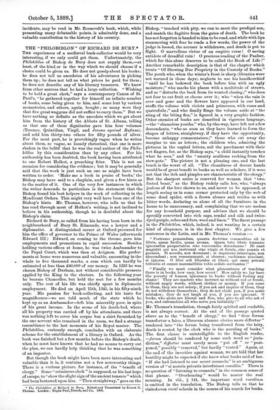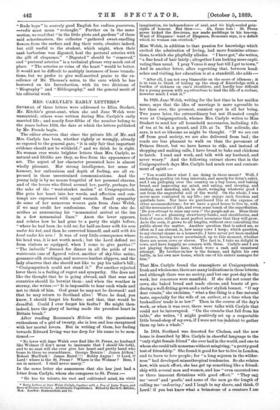THE "PHILOBIBLON " OF RICHARD DE BURY.* THE experiences of
a mediaeval book-collector would be very interesting, if we only could get them. Unfortunately, the Philobiblon of Bishop de Bury does not supply them,—at least, of the kind or in the way which we should choose if a choice could be given us. He does not gossip about his books ; he does not tell us anecdotes of his adventures in picking them up ; he does not tell us what prices he paid for them ; he does not describe any of his literary treasures. We know from other sources that he had a large collection. " Wishing to be held a great clerk," says a contemporary Canon of St. Paul's, " he gathered together for himself an infinite number of books, some being given to him, and some lent by various monasteries, and others, again, bought ; so many were they that five great waggons did not suffice to carry them." But we have nothing so definite as the anecdote which we get about him from the history of the Abbots of St. Albans, telling us that one of these dignitaries gave him four volumes (Terence, Quintilian, Virgil, and Jerome against Eufinus), and sold him thirty-two others for fifty pounds of silver. For the most part, he is provokingly vague when he writes about them, so vague, so loosely rhetorical, that one is more shaken in the belibf that he was the real author of the Philo- biblon by this consideration than by any other. For his authorship has been doubted, the book having been attributed to one Robert Holkot, a preaching friar. This is not an occasion for considering the evidence; but it may be generally said that the work is just such an one as might have been written to order. Make me a book in praise of books,' the Bishop may have said to a chaplain, and given a few hints as to the matter of it. One of the very few instances in which the writer descends to particulars is the statement that the Bishop found his best helpers in the work of collecting in the Mendicant Orders. This might very well have been one of the Bishop's hints. Mr. Thomas, however, who tells us that he has read through most of Holkot's writing, is not inclined to believe in his authorship, though he is doubtful about the Bishop's claim.
Richard de Bury, so called from his having been born in the neighbourhood of Bury St. Edmunds, was a lawyer and a diplomatist. A distinguished career at Oxford procured for him the office of governor to the Prince of Wales (afterwards Edward III.) Edward, on coming to the throne, gave him employments and promotions in rapid succession. Besides holding various offices at home, he was twice Ambassador to the Papal Court, which was then at Avignon. His prefer- ments at home were numerous and valuable, amounting in the whole to five thousand marks, a sum which can hardly be estimated at less than 240,000 of our money. In 1333 he was chosen Bishop of Durham, not without considerable pressure applied by the King to the electors. In the following year he became Chancellor, but held the seat for a few months only. The rest of his life was chiefly spent in diplomatic employment. He died on April 15th, 1345, in his fifty-ninth year. His passion for book-collecting, and his taste for magnificence—we are told much of the state which he kept up as an Ambassador—left him miserably poor, in spite of his great income. In the scene of his death-bed, where all his property was carried off by his attendants, and there was nothing left to cover his corpse but a shirt furnished by the one servant who remained in the room, we find a strange resemblance to the last moments of his Royal master. The Philobiblon, curiously enough, concludes with an elaborate scheme for the establishment of a library in Oxford. As the book was finished but a few months before the Bishop's death, when he must have known that he had no means to carry out the plan, we can hardly help thinking that he was something of an impostor.
But though the book might have been more interesting and valuable than it is, it contains not a few noteworthy things. There is a curious picture, for instance, of the " benefit of clergy." Some " criminous clerk" is supposed, as his last hope of escape, to "show the slight sign of the ancient tonsure" which had been bestowed upon him. " Then straightway," goes on the
• The Phaobalon of Richard de Bury. Edited and Translated by Ernest C. Thomas. London : Kegan Pan). Trench, and Co. 1888.
Bishop, " touched with pity, we run to meet the prodigal son, and snatch the fugitive from the gates of death. The book he has not forgotten is handed to him to be read, and while with lips stammering with fear he reads a few words, the power of the
judge is loosed, the accuser is withdrawn, and death is put to flight. 0 marvellous virtue of an empiric verse ! 0 saving antidote of dreadful rain ! 0 precious reading of the Psalter,
which for this alone deserves to be called the Book of Life !"
Another remarkable description is that of the chapter which treats " Of Showing Due Propriety in the Custody of Books."
The youth who, when the winter's frost is sharp (libraries were not warmed in those days), neglects to use his handkerchief " until he has bedewed the book before him with an ugly moisture;" who marks his places with a multitude of straws, and so " disturbs the book from its wonted closing ;" who does.
not fear to eat fruit or cheese over it ; who "when the rain is over and gone and the flowers have appeared in our land, stuffs the volume with violets and primroses, with roses and quatrefoils ;" and who finally flings the volume aside at " the sting of the biting flea," is figured in a very graphic fashion.
Other enemies of books are described in vigorous language, —the " shameless youths," who, by-the-way, have left not a few descendants, "who as soon as they have learned to form the shapes of letters, straightway, if they have the opportunity, become unhappy commentators ;" those who cut away the margins to use as letters ; the children who, admiring the pictures in the capital letters, soil the parchment with their wet fingers, for, as the Bishop says, "a child instantly touches what he sees," and the " smutty scullions reeking from the stew-pots." The picture is not a pleasing one, and the last touch is the worst of all. " The cleanliness of decent hands would be of great benefit to books as well as scholars, if it were not that the itch and pimples are characteristic of the clergy." But the sharpest satire is reserved for woman, that " two- footed beast," as the Bishop rudely calls her, who, "always jealous of the love shown to us, and never to be appeased, at length seeing us in some corner protected only by the web of some dead spider, with a frown abuses and reviles us with bitter words, declaring us alone of all the furniture in the house to be unnecessary, and complaining that we are useless for any household purpose, and advises that we should be speedily converted into rich caps, sendal and silk and twice- dyed purple, robes and furs, wool and linen." The finest passage in the Philobiblon, which, indeed, is not wanting in a certain kind of eloquence, is in the first chapter. We give a few sentences in the Latin, and in Mr. Thomas's version Postremo pensandum, quanta doctrines commoditas sit in libris, quam facilis, quam arcane. Quern tuto libris humazue ignorantiie paupertatem sine verecundia denudamus ! Hi aunt magistri qui nos instruunt sine virgis et ferula, sine pannis et petunia. Si sexed* non dormiunt ; si inquirens interrogas, non abscondunt ; non remurmurant, si oberres ; cachinnos nescinnt, si ignores. 0 libri soli liberates et liberi, qui omni petenti tribuitis at opines manumittitis vobis sedulo servientes !"
" Finally we must consider what pleasantness of teaching there is in books, how easy, how secret ! How safely we lay bare the poverty of human ignorance to books without feeling any shame ! They are masters who instruct us without rod or ferule, without angry words, without clothes or money. If you come to them, they are not asleep; if you ask and inquire of them, they do not withdraw themselves ; they do not chide you, if you make mistakes ; they do not laugh at you, if you are ignorant. 0 books, who alone are liberal and free, who give to all who ask of you, and enfranchise all who serve you faithfully !"
Mr. Thomas's translation, though fairly spirited and readable,
is not always correct. At the end of the passage quoted above as to the " benefit of clergy," we find " dum foram transfertur a laico, a librorum alumno clerico more differtur " rendered into " the forum being transferred from the laity, death is routed by the clerk who is the nursling of books." The first clause is unintelligible to the English reader, —forum should be rendered by some such word as "juris- diction," difertur must surely mean " put off " or " post-
poned," possibly " removed," but hardly " routed." Again, at
the end of the invective against woman, we are told that her hostility might be expected if she knew what books said of her.
" If she had listened to our secret counsels," is an ambiguous version of " si nostris privatis interftasset consiliis." There is no question of "listening to counsels," in the common sense of that phrase. " Overhearing " would be nearer the real meaning. In viii., § 141, the important word ruratium,
is omitted in the translation. The Bishop tells us that he visited even rural schools in the course of his search for books. ‘. Rude boys " is scarcely good English for rudium puerorum, —rudis must mean " untaught." Farther on in the same section, we read that " in the little plots and gardens " of these said schoolmasters, the collector " gathered sweet-smelling flowers from the surface and dug their roots, obsolete indeed, but still useful to the student, which might, when their rank barbarism was digested, heal the pectoral arteries with the gift of eloquence." " Digested " should be "removed," and " pectoral arteries " is a technical phrase very much out of place. " The arteries or veins of the heart " would be better. It would not be difficult to multiply instances of loose transla- tions, but we prefer to give well-merited praise to the ex- cellence of Mr. Thomas's notes, to the care which he has bestowed on his Introduction, with its two divisions of " Biography " and " Bibliography," and the general merit of his editorial work.







































 Previous page
Previous page